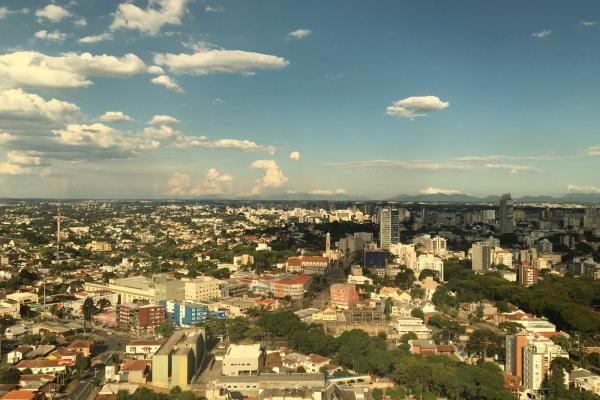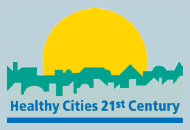Halfway round the world

In mid December, Belfast Healthy Cities joined a delegation that swapped the ice and snow of Belfast for four days in the city of Curitiba in southern Brazil. The aim of the trip was to learn about the city’s ground breaking approach to planning and transport, and to find out about initiatives supporting older people.
Anne and Jonna took part in the trip, which formed part of the Healthy Urban Living and Ageing in Place (HULAP) research project led by Queen’s University Belfast in collaboration with the Pontiff Catholic University of Paranã, based in Curitiba. The aim of the research project is to explore how physically active older people in each city are, what their local environment is like and how older people perceive it, in order to identify key elements of an urban environment that supports older people to be physically active. Belfast Healthy Cities is contributing to a work package aiming to encourage policy makers to use research findings more extensively in decision making, and has provided the secretariat for an Impact Advisory Group consisting of key agencies in Belfast in the built environment and ageing sectors.
The delegation was very helpfully and effectively led by Prof Geraint Ellis from QUB, supported by fellow QUB researcher Sara Moutinho Barbosa de Melo, who as a native Portuguese speaker was an invaluable help with everything from directions to engaging with local service users. Three Impact Advisory Group members also took part, including Linda Robinson from Age NI, Dermot O’Kane from Belfast City Council and Stephen Wood from the Department for Infrastructure. Prof Geoff Green, member of the International Advisory Group for the project, also joined the delegation.
After some early drama sprinting for the flight from London to Sao Paulo, the delegation arrived in a very sunny Curitiba, where we were very kindly looked after by the hosts, Dr Adriano Akira Hino from Pontiff Catholic University of Paranã, Prof Ciro Rodriguez Añez and Brazilian project lead, Prof Rodrigo Reis (based at Washington University St Louis). Our hosts took us everywhere from the viewing tower with spectacular views of the city, which has concentrated high rise buildings along public transport corridors creating a canyon effect, to the ‘citizenship street’, an initiative providing key public services and discount fruit and vegetable shops in buildings located at public transport hubs throughout the city of 1.7m people, and community centres providing activity classes for older people.
The delegation also visited the Planning Institute of Curitiba, where we had a presentation on the rationale and implementation of the innovative planning and transport approach that has made Curitiba world famous. The city developed the world’s first bus rapid transport system in the 1970s, and has concentrated development along the bus corridors ever since. Today, the transport system is self sustaining at a fare equivalent to £1 per journey.
The final day was spent on a leisurely train trip through rainforest with breathtaking views, which provided an ideal opportunity to reflect on everything we had seen and learnt. What is certain is that there is a lot Belfast can learn from elsewhere; now, the task is to see how we can build on the ideas and contacts made.


